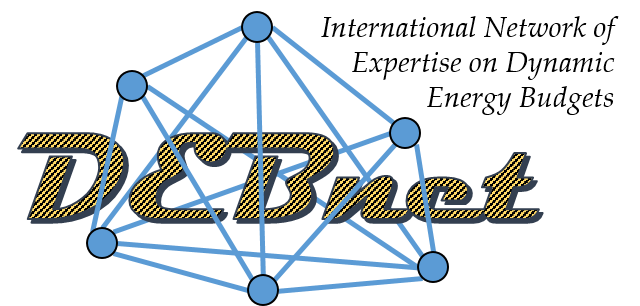Welcome to the DEBtox information site
Welcome to the DEBtox information page, the
site for people that want to make sense of ecotoxicity data.
This site contains information on mechanistic models for the
analysis of stressor effects on the life-history traits of
individual organisms (and from there to higher and lower
levels of biological organisation). Specifically, this site
is about models based on animal energy budgets (DEBtox and DEBkiss) and survival models
from the GUTS framework.
This website constitutes a node in the international DEBnet
network, together with the associated site of DEBtox Research.
The mission of DEBtox.info is to simplify biology to get to
the essence of what toxicants (and other stresses) are doing
to organisms. Simplification is necessary if we want to gain
understanding. Furthermore, we cannot expect to test even a
small fraction of all possible (combinations of) toxicants,
species and environmental conditions. Once we get to the
essence, it is possible to make educated predictions of
toxicant effects for untested chemicals, untested species,
and under untested conditions.
Here, you can find information, lists of relevant
publications, (links to) free e-books, and
freely-downloadable Matlab packages to analyse your data.
Use the major categories on the top left of the screen to
navigate through this site; the corresponding sub-categories
will appear right next to it in the sub-menu.
|

|
Errors and warnings
For users of BYOM versions before v.
5.0, see the notes and warnings on the BYOM
page (bottom of page). But, really, you should have updated
long ago! If you are working with BYOM, and would
like to be notified immediately in case of errors,
new versions, etc., email
me and I will include you in a mailing list. I
may also use this mailing list for other important
developments such as new (versions) of the e-books,
and new papers. This saves you the hassle of
checking this website every week ;-).
Summary of more recent errors in BYOM. For more
detail, check the BYOM
page.
Error
in BYOM version 4.5-6.2. I
found an error in calc_parspace, in the 'extra
sampling' code block. Corrected
in BYOM v.6.3.
Matlab
R2023a throws errors in BYOM v.6.5 and
earlier. The newest version of Matlab
does not allow the cell-array format for
name-value pairs anymore. Solved with the
update to BYOM v.6.6.
Issues with
moving-time-window EPx calculations in
BYOM v.6.4-6.6. Issues
with the reporting of the function
calc_epx_window_batch. Error in the EPx
calculations, leading
to erroneous calculations when the exposure
scenario has a low time resolution. Both
issues repaired with the update to BYOM
v.6.7.
Announcements
OpenGUTS v1.2. The
free and open-source software openGUTS v1.2
is now available for download!
It is available as a standalone Windows
executable or as Matlab package. It supports
the use of GUTS for
regulatory purposes, but will also prove
useful for scientific studies. The dedicated
website http://openguts.info/
provides more information.
For more information on this
software and the changes relative to
previous versions, see the openGUTS
website.
Changes
at Leanpub (keeping my e-books free). Things
changed a bit at Leanpub. My free e-books, from some
point onward, required a paid membership to Leanpub
for free download. While I do want to support
Leanpub, I want most of my e-books to be really free
(and free of access hurdles). And, I am not sure
whether the people that are interested in my books
would also have an interest in the other books
offered at Leanpub. I noticed this change at Leanpub
on 19 Sept. 2022, and immediately changed the
settings so my free e-books are again totally free.
I noticed that some of my e-books are also offered
on other (rather shady) web sites. Please get them
through Leanpub only!
DeEP tool. Take a look at
the DeEP tool
for EPx predictions with DEBtox2019.
Note that this tool does not perform calibrations or
validations on data sets, but rather makes EPx
predictions for exposure profiles, such as those
from FOCUS calculations. BYOM contains a function to
translate calibration output to a DeEP input file.
There also have been dedicated short courses for
this tool at SETAC-Europe conferences. Note that the
DeEP site hosts an on-line calculation tool, but
also a downloadable setup file for a standalone
application.
Upcoming courses and events
- Roman Ashauer and Tjalling Jager gave an on-line short
course on openGUTS
at the 2020 SETAC SciCon. This course is now available
for everyone via Leanpub: https://leanpub.com/c/openguts.
Although you don't get the interaction with the
instructors, this is still a nice way to educate
yourself at home.
- A next run of the DEB school and symposium is planned
for the first half of 2025. More information will become
available here.
- The next TKTD Autumn School on dynamic modelling of
toxic effects is planned to run in Oct-Nov 2024. More
information is available at the course page from
Copenhagen University here.
The course will have an on-line part and an on-site part
in Denmark.
- The PrediTox winter school is running again from 27-31
January 2025 in Lyon, France (with a few spaces for
virtual participation). Among the topics is also TKTD
modelling with GUTS. More
information.
- ...
Job opportunities for TKTD/DEB modellers
- Nothing that I know of at the moment.
Latest news
- 28 April 2024: my paper on identifying and predicting
delayed mortality with GUTS is now officially published
in an issue of ETC. Available via DOI or contact me
for a PDF.
- 22 April 2024: the GUTS e-book was positively reviewed
in IEAM.
- 9 April 2024: adding a BYOM package for
GUTS-immobility, expanding GUTS to distinguish between
(reversible) immobility and (irreversible) death. A
publication on this model is upcoming. This package
requires BYOM v.6.9 (or newer). See BYOM downloads
page.
- 9 April 2024: new version 6.9 of BYOM, with small
updates and preparation for the GUTS-immobility package.
See BYOM
downloads page.
- 20 March 2024: release of an update of the openGUTS
standalone to v.1.2 so fix an error message for (very)
specific data sets and to calculate additional LCx
values to support risk assessment for bees following the
EFSA
guidance. See openGUTS download page. The Matlab
version has also been updated to v.1.2 (it did not
suffer from the error in the standalone, but the
additional LCx are now, by default, produced).
- 8 March 2024: UBA report "Critical evaluation of
effect models for the risk assessment of plant
protection products" was just published. Download
link.
- 28 February 2024: new paper out on identifying and
predicting delayed mortality with GUTS. Still 'early
view' but available as formatted PDF. Available via DOI or contact me
for a PDF.
- 5 February 2024: minor update of the DEBkiss e-book.
See the support page.
- 5 December 2023: new paper of Romoli et al
on-line! In this paper, we compare standard DEB-TKTD
with DEBtox (DEBkiss-TKTD) on typical datasets for
environmental risk assessment of pesticides. Download from
publisher's website. (available open access now!)
- 22 September 2023: new version of the DEBtox_classic
package for BYOM. Small changes to make the calculations
more efficient, and allowing for time-to-death data. See
version log for all changes. See BYOM downloads
page. Note that using time-to-death data also requires
updating to BYOM v.6.8.
- 21 September 2023: new version of the GUTS package for
BYOM. Small changes to make the calculations more
efficient, and allowing for time-to-death data. See
version log for all changes. See BYOM downloads
page. Note that using time-to-death data also requires
updating to BYOM v.6.8.
- 18 September 2023: small update of BYOM. Added an
option to use time-to-death data, small functionality
improvements for EPx calculations, preparations for the
DEBtox_mix package. Also added the experimental
DEBtox_mix package for DEBtox2019-based analysis of
binary mixture data. See BYOM downloads page.
- 18 September 2023: removed the menu entry for the
DEBtoxM software. The last update was in 2015, and I do
not maintain nor use this software anymore. The web page
still exists here, so old links will still
resolve.
- 7 August 2023: released a new version of the "Making
sense ..." e-book. The most important change is a
complete overhaul of the case studies to reflect the
latest thinking and methods for DEB-based TKTD analysis.
More
information.
- 20 July 2023: released a new version of the GUTS
e-book, adding a.o. a new case study with openGUTS. More
information.
Old 'news' over here.
|





